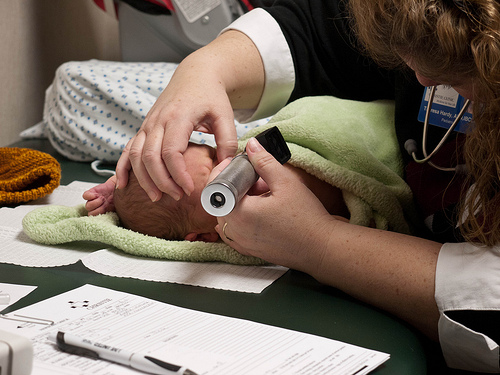 Nurses are often asked the questions “are you a doctor?” or “why didn’t you go to medical school?” It is all too easy to respond to the questioner with “I’m just a nurse” implying that somehow being a nurse is not sufficient to meet the expectations of the questioner. The fact is that most people a nurse will meet have no idea what a nurse actually does. Fellow medical practitioners who work with nurses have a respect and understanding of the collaborative and vital contributions he/she makes. Most people outside the profession have vague ideas of someone who takes the patient to the examining room, takes blood pressure, and tells the patient to wait for the doctor.
Nurses are often asked the questions “are you a doctor?” or “why didn’t you go to medical school?” It is all too easy to respond to the questioner with “I’m just a nurse” implying that somehow being a nurse is not sufficient to meet the expectations of the questioner. The fact is that most people a nurse will meet have no idea what a nurse actually does. Fellow medical practitioners who work with nurses have a respect and understanding of the collaborative and vital contributions he/she makes. Most people outside the profession have vague ideas of someone who takes the patient to the examining room, takes blood pressure, and tells the patient to wait for the doctor.
Nurses discuss the pathophysiology of a patient’s situation with the physician and together they make a plan for patient care. Sometimes the nurse’s suggestions for a course of action are taken and sometimes there may be new information from the doctor and that knowledge is incorporated into the plan for patient care. But the point is, the doctor is not condescending to the nurse, they discuss things together and determine the best plan of care for the patient. It is a collaborative relationship. The nurse also works collaboratively with the other medical personnel at all the varied levels of training and expertise.
The work
Recently a practicing nurse wrote a blog describing some of the activities she did during a normal 12 hour work day. The nurse who wrote this blog started working as an RN and continued on to obtain her Masters in Management and Leadership in Nursing because she wanted the additional course work to be well rounded and to gain the additional respect she believes the credential brings. The work she described with one young patient includes the following:
- Caring for a small child on a ventilator with “multiple intravenous medications infusing through central lines keeping the vascular system constricted or dilated.”
- Monitoring blood gases and adjusting the ventilator settings as needed
- Adjusting medications as needed to maintain blood pressure
- Keeping the patient adequately sedated and paralyzed for safety of the patient without over medicating
- Determining the proper balance which is often the nurse’s responsibility
Nurses are there for the joy and relief of newly cured diseases and the arrival of new born babies. They are frequently involved in maintaining the patient’s dignity through difficult long term decisions and heart breaking situations, diseases too powerful and lives changed permanently. The patient is often the entire family. The nurse assesses advocates and cares. Most nurses do not become nurses because they couldn’t get in to medical school. They become nurses because they love what they do.
In the broadest sense possible a nurse is a professionally-trained health care practitioner working to enhance the welfare of individuals, families and communities. In fact, the American Nurses Association outlines the goal of a nurse as the protection and optimization of health and the prevention or elimination of degenerative disease.
Nursing in the 21st Century
 Nursing has branched out to include a larger scope of services and responsibilities. Nurses today are in public health, hospitals, clinics, homes, schools and even in pharmaceutical labs doing research. Today there are occupational health nurses and midwives trained for and operating within a specialized setting.
Nursing has branched out to include a larger scope of services and responsibilities. Nurses today are in public health, hospitals, clinics, homes, schools and even in pharmaceutical labs doing research. Today there are occupational health nurses and midwives trained for and operating within a specialized setting.
Ideally, nurses would work out an academic path that suited their dispositions and the current areas of work available. Some nurses work as lecturers for nationally-recognized healthcare think-tanks while others work as nurse practitioners across a variety of settings.
A nurse practitioner is an advanced practice registered nurse who has attained training beyond that of a registered nurse. The duties and responsibilities of nurse practitioners are regulated at the state level but a recent Pearson Report claimed that today’s nurse practitioners obtain medical histories, diagnose chronic diseases, and even provide primary and specialist care.
Trisha Vivona is a freelance writer and social media talent valuing innovation, hard work, and a relentless approach to creating value for clients and stakeholders. She can be reached on Twitter, Facebook, Google+ and LinkedIn.
You know what this reminds me of? When introducing self to others many of us say, “I’m so-and-so and I am a (fill in the blank with position)”. Many times (especially if you are an entrepreneur and taught how to introduce yourself at networking events), many times this causes people’s eyes to glaze over. They already have their perception of what your ‘job’ is. So they really aren’t listening to you. What I love about this article is the bulletted list of things that nurses actually DO.
Instead of introducing ourselves as “I’m Elizabeth and I’m a nurse”, we could say something like “I’m Elizabeth and I save people’s lives who come into the emergency room with cuts, bruises, and gun shot wounds.” (Now I don’t do that, but you can see how it is much more appealing and people are much more likely to listen to you!
Great article, thank you for sharing!!